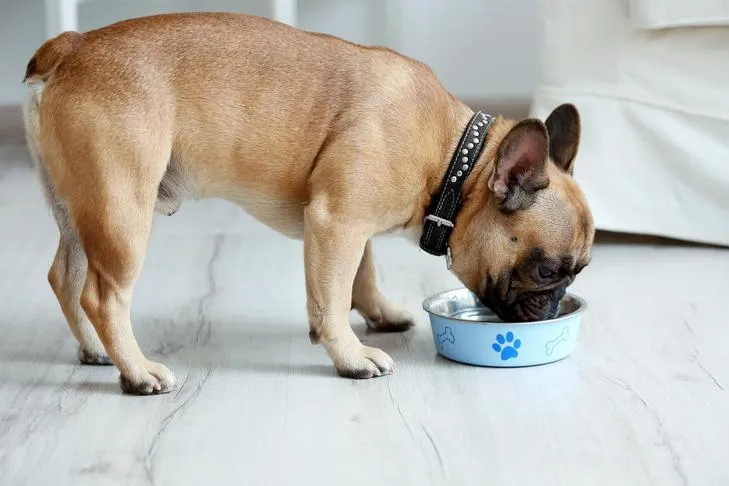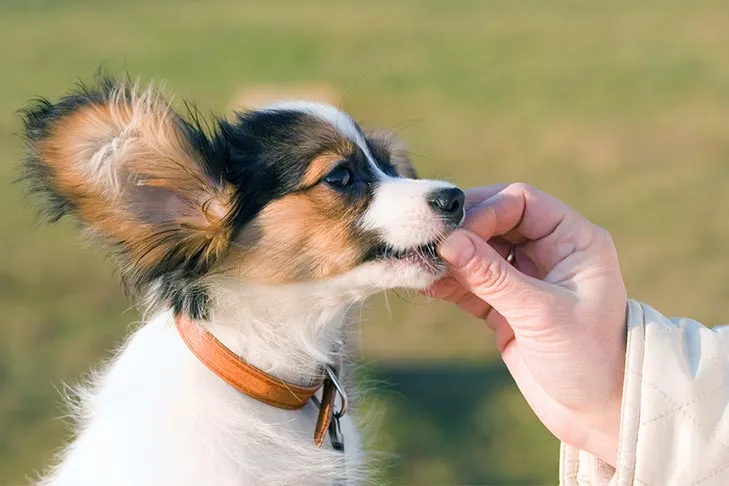Sharing food with our beloved canine companions is a natural impulse for many pet owners. As you enjoy a meal or snack, it’s tempting to offer a bite to those eager eyes watching you from below. However, not all human foods are safe for dogs, and some can even be toxic, leading to serious health issues. Understanding which “normal” foods your dog can eat safely is crucial for their well-being. This comprehensive guide from Dog Care Story will walk you through common human foods that are generally safe for dogs, along with important considerations for feeding them. Always prioritize your dog’s health and consult your vet for any dietary concerns, especially when introducing new foods or if you need to know what are foods that dogs can’t eat.
Safe and Healthy Human Foods for Your Dog
Many everyday foods found in your kitchen can be healthy and enjoyable treats for your dog when offered in moderation and prepared correctly.
Bread
Plain bread, in small amounts, is generally safe for dogs. It won’t provide significant nutritional benefits, but it also won’t cause harm as long as it’s free from spices, especially garlic or onion, and absolutely no raisins. Raisins are highly toxic to dogs. Store-bought breads often contain preservatives, so homemade varieties are slightly better, though it’s best viewed as an occasional, low-value treat. While these are safe options, remember there are many human foods your dog should never touch. For a comprehensive list, see what food dogs can’t eat.
Cashews
Cashews can be a good treat for dogs in small quantities. They contain beneficial nutrients like calcium, magnesium, antioxidants, and protein. However, despite having less fat than some other nuts, feeding too many cashews can contribute to weight gain. Always ensure they are unsalted to avoid excessive sodium intake, which is unhealthy for dogs. A few plain, unsalted cashews make for a fine occasional snack.
Cheese
Many dogs adore cheese, and in small to moderate amounts, it’s generally safe for them. Most dogs can digest lactose, though some may be intolerant, which is rare. Cheese can be a good source of protein and calcium. Opt for lower-fat varieties like cottage cheese or mozzarella to prevent excessive fat intake, which can lead to digestive upset or pancreatitis. Many specialized dog chews are also made from dried cheese, offering a safe and enjoyable option.
 All American Dog resting its head on the kitchen table looking at cheese.
All American Dog resting its head on the kitchen table looking at cheese.
Coconut
Coconut is a versatile fruit that offers several health benefits for dogs. It contains lauric acid, which possesses antibacterial and antiviral properties. Additionally, coconut can help improve bad breath and soothe skin conditions such as hot spots, flea allergies, and itchy skin. Both coconut milk and coconut oil are safe for dogs. When feeding fresh coconut, ensure the hard, fibrous shell is completely removed to prevent choking or intestinal obstruction. Understanding a dog’s sensitive digestive system is crucial. Just as you learn what they can eat, it’s vital to know what food should I not feed my dog.
Corn
Corn is a common ingredient in many commercial dog foods, and for good reason—it’s a source of carbohydrates, protein, and fiber. Dogs can safely eat corn kernels, but it’s essential to remove them from the cob. The cob itself is difficult for dogs to digest and can cause serious intestinal blockages requiring veterinary intervention. Cooked, plain corn kernels can be a sweet and crunchy treat.
Eggs
Fully cooked eggs are an excellent source of protein, vitamins, and minerals for dogs. They can also be particularly helpful for dogs with an upset stomach due to their easy digestibility. However, never feed raw egg whites, as they contain avidin, an enzyme that can interfere with biotin absorption, leading to a biotin deficiency over time. Always ensure eggs are thoroughly cooked—scrambled, boiled, or poached—before offering them to your pet.
Fish
Fish, particularly salmon and sardines, can be a fantastic addition to your dog’s diet. They are rich in omega-3 fatty acids, which promote healthy skin and coat, support brain function, and reduce inflammation. Salmon also provides plenty of vitamins and protein, while sardines offer calcium from their soft, digestible bones. Always serve fish fully cooked and cooled, and meticulously remove all tiny bones, except for sardines where the bones are soft enough to be safe. Limit fish intake to no more than twice a week. Never feed raw or undercooked fish, as it can contain harmful parasites.
Ham
While a small piece of ham might seem like a harmless treat, it’s not the healthiest option for your dog. Ham is typically high in sodium and fat, which can lead to digestive upset, excessive thirst, and potentially pancreatitis with regular consumption. An occasional, tiny, unseasoned piece is unlikely to cause harm, but it should not become a regular part of their diet. Prioritize leaner, unseasoned meats as healthier alternatives.
 French Bulldog eating from a bowl at home.
French Bulldog eating from a bowl at home.
Honey
Honey is more than just a sweet treat; it’s packed with beneficial nutrients like vitamins A, B, C, D, E, K, potassium, calcium, magnesium, copper, and powerful antioxidants. Feeding small amounts of local honey can even help dogs with seasonal allergies by gradually exposing their immune systems to local pollen. Beyond consumption, honey also possesses antiseptic properties and can be used topically on minor burns or superficial cuts for its healing benefits. It’s also particularly important to be careful with younger dogs; their systems are more delicate. Learn more about what food is bad for puppies.
Milk
While dogs can technically have milk, caution is advised. Many adult dogs are lactose intolerant to varying degrees, meaning they lack the enzyme needed to digest lactose efficiently. This can lead to digestive upset, including diarrhea and gas. If you offer a small amount of milk, observe your dog for any adverse reactions. Plain water is always the best and safest option for hydration.
Peanut Butter
Peanut butter is a popular and often beloved treat for dogs, offering an excellent source of protein, heart-healthy fats, and vitamins B and E. The healthiest choice is raw, unsalted peanut butter without any added sugars. Crucially, always check the label to ensure it does not contain xylitol, an artificial sweetener that is highly toxic and potentially fatal to dogs. A spoonful of xylitol-free peanut butter can be a great way to administer medication or simply as a special reward.
Peanuts
Unlike some other nuts that are dangerous (like macadamia nuts or almonds), plain, unsalted peanuts are safe for dogs. They are rich in good fats and proteins that can benefit your dog’s health. However, like cashews, they should be given in moderation due to their high-fat content, which can cause pancreatitis if consumed in excess. Always avoid salted peanuts to prevent too much sodium intake.
Popcorn
When prepared correctly, air-popped, unsalted, and unbuttered popcorn can be a safe and fun treat for your dog in moderation. It contains riboflavin and thiamine, which contribute to eye health and digestion, along with small amounts of iron and protein. The most important precaution is to ensure all kernels are fully popped, as unpopped kernels can pose a choking hazard or become lodged in your dog’s teeth.
Pork
Pork is a highly digestible protein source, rich in amino acids, and can be a good option for dogs, especially those with sensitivities to other common proteins like chicken or beef. While it tends to be higher in calories per pound than some other meats, lean cuts can be beneficial. Always serve pork fully cooked and unseasoned, and ensure there are no bones, as cooked bones can splinter and cause internal damage.
Quinoa
Quinoa, a highly nutritious pseudocereal, is increasingly found in high-quality dry dog foods. Its excellent nutritional profile makes it a healthy alternative to common starches like corn, wheat, and soy. Quinoa provides protein, fiber, and essential amino acids. When feeding quinoa to your dog, ensure it is thoroughly cooked and served plain, without any added spices or seasonings.
 Samoyed puppy laying in the grass outdoors.
Samoyed puppy laying in the grass outdoors.
Salmon
As reiterated, fully cooked salmon is a nutritional powerhouse for dogs. It’s an outstanding source of protein, healthy fats, and amino acids, boosting joint health, brain function, and the immune system. The critical point to remember is that salmon must be thoroughly cooked. Raw or undercooked salmon can contain parasites that cause “salmon poisoning disease,” a severe and potentially fatal condition in dogs, leading to vomiting, diarrhea, and dehydration. Proper cooking kills these parasites, making salmon a safe and beneficial food.
Shrimp
A few shrimp given occasionally can be a healthy snack for your dog. Shrimp are low in fat, calories, and carbohydrates, while being rich in antioxidants, vitamin B-12, and phosphorus. The key is to ensure they are fully cooked and that the shell, tail, head, and legs are completely removed. Raw shrimp can carry harmful bacteria, and shells can be a choking hazard or cause digestive issues.
Tuna
Cooked, fresh tuna can be a good source of omega-3 fatty acids for dogs, promoting heart and eye health, but should only be given in very small amounts. Canned tuna, while convenient, should be limited due to its mercury content and often high sodium levels. If you do offer canned tuna, choose varieties packed in water (not oil) and ensure it contains no added spices or seasonings. A small amount of tuna juice can also be a tasty and hydrating treat.
Turkey
Plain, cooked turkey is generally safe for dogs and can be a lean source of protein. When feeding turkey, make sure to remove all excess fat, skin, and especially bones. Poultry bones, when cooked, become brittle and can splinter, posing a serious risk of choking or internal damage. Always serve turkey unseasoned, as common seasonings like onions, garlic, and excessive salt are toxic to dogs.
Wheat or Grains
Contrary to popular belief, grains are not inherently bad for dogs unless they have a diagnosed allergy. In fact, whole grains like wheat, oats, and corn provide essential nutrients such as protein, healthy fats, and fiber, which aid in digestion and provide energy. Many high-quality dog foods include grains. If your dog has specific sensitivities, your veterinarian can help determine if a grain-free diet is appropriate, but for most dogs, grains are a healthy dietary component.
Yogurt
Plain yogurt can be a perfectly acceptable and even beneficial snack for dogs. The active bacteria (probiotics) in yogurt can help support a healthy digestive system. However, as with milk, some dogs may have difficulty digesting dairy. Always choose plain, unsweetened yogurt, and absolutely avoid any varieties containing artificial sweeteners, especially xylitol, which is toxic to dogs. Greek yogurt can be a good option as it often contains less lactose.
 Papillon puppy gently taking a treat from a hand.
Papillon puppy gently taking a treat from a hand.
Important Considerations When Feeding Human Foods
While many human foods are safe for dogs, responsible feeding practices are crucial. Always introduce new foods slowly and in small quantities to monitor for any digestive upset or allergic reactions. Avoid foods with added salt, sugar, artificial sweeteners (especially xylitol), onions, garlic, and excessive fats, as these can be detrimental to your dog’s health. Always cook meats and fish thoroughly, and remove all bones. If your dog is ever feeling unwell, remember to consult your veterinarian immediately. For specific guidance on nourishing a recovering pet, you might explore what can you give a sick dog to eat.
Conclusion
Sharing “normal” human foods with your dog can be a rewarding experience, strengthening your bond and adding variety to their diet. From cooked eggs and lean meats to certain fruits and vegetables, many kitchen staples can offer nutritional benefits and enjoyable treats when given properly. However, always prioritize your dog’s health by understanding which foods are safe and how to prepare them. By being mindful of portion sizes, avoiding toxic ingredients, and consulting your veterinarian with any concerns, you can ensure your furry friend enjoys these human snacks safely. For more expert advice on canine nutrition and care, explore other articles on Dog Care Story.
